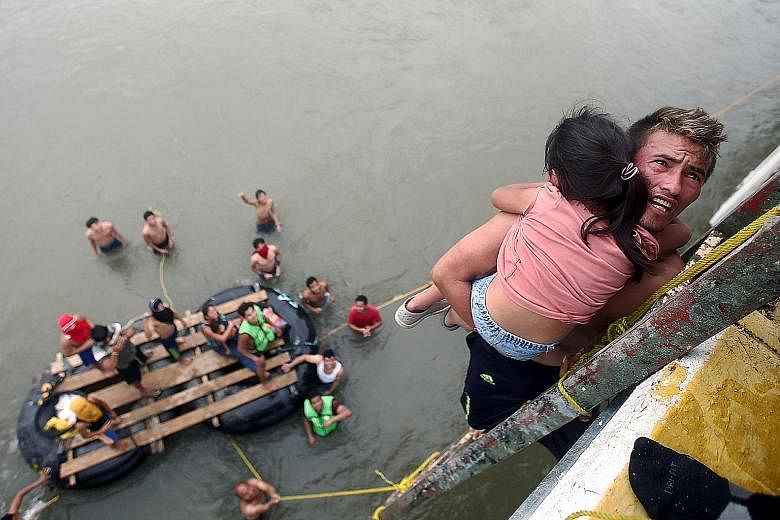CIUDAD HIDALGO (Mexico) • Thousands of Honduran immigrants resumed their march towards the United States yesterday from the southern Mexican city of Ciudad Hidalgo.
The Mexican authorities last Thursday managed to block the "caravan" of immigrants on a border bridge between Mexico and Guatemala, but many later entered via a river separating the two countries.
"No one is going to stop us, after all we've gone through, like crossing the river," said 21-year-old Aaron Juarez, who was accompanied by his wife and baby and was walking with difficulty because of an injury.
Said Mr Edwin Geovanni Enamorado, a Honduran farmer who was part of the caravan: "We are tired but very happy, we are united and strong."
The immigrants are generally fleeing poverty and insecurity in Honduras, where powerful street gangs rule their turf with brutal violence.
With a homicide rate of 43 per 100,000 citizens, Honduras is one of the most violent countries in the world.
The caravan originated in the Honduran town of San Pedro Sula a week ago, with about 2,000 would-be immigrants drawn together by social media.
Yesterday morning, about a thousand immigrants, including women and children, were still stranded on a border bridge, hoping to enter Mexico legally via Guatemala.
The day before, the Mexican authorities opened the border to women and children who were then taken to a shelter in the city of Tapachula, about 40km from Ciudad Hidalgo, Mexico.
"Mexico will not allow irregular entry into its territory, much less violent," Mexican President Enrique Pena Nieto said last Friday in a video message. He described the situation as "unprecedented".
United States President Donald Trump has been tweeting about the caravan's progress and thanked the Mexican authorities last Saturday for their efforts to block it.
"Mexico has been so incredible. Thank you Mexico and the leaders of Mexico, thank you. And you know why, because now Mexico respects the leadership of the United States."
Last week, Mr Trump threatened to cut aid to the region, deploy the military and close the US-Mexican border if the authorities did not stop the immigrants.
Honduran President Juan Orlando Hernandez and his Guatemalan counterpart Jimmy Morales continued Mr Trump's theme after they met in Guatemala last Saturday to discuss the crisis.
Said Mr Morales: "This migration has political motivations, which is violating the borders and the good faith of the states and, of course, putting at risk the most important thing, people."
Mr Hernandez also deplored "the abuse of people's needs" for "political reasons". "Without a doubt, we have a lot to do so that our people can have opportunities in their communities," he said.
The caravan of mainly Honduran immigrants surged through a series of police lines and barricades up to the final fence on Mexico's southern border last Friday. Sections of the crowd hurled rocks and other objects at hundreds of riot police, who responded with rubber bullets and tear gas - stalling the caravan determined to reach the US.
Several people were injured. Police used tear gas to drive the immigrants back and calm was restored.
Guatemala has organised a fleet of buses to take Hondurans back to their country. More than 300 people have taken up a government offer of a bus ride home, police said.
"It is better to go back. It is very hard. There is a lot of disorder," said 25-year-old Honduran Bryon Rivera, who decided to give up on a long-held dream of a better life in America.
AGENCE FRANCE-PRESSE

